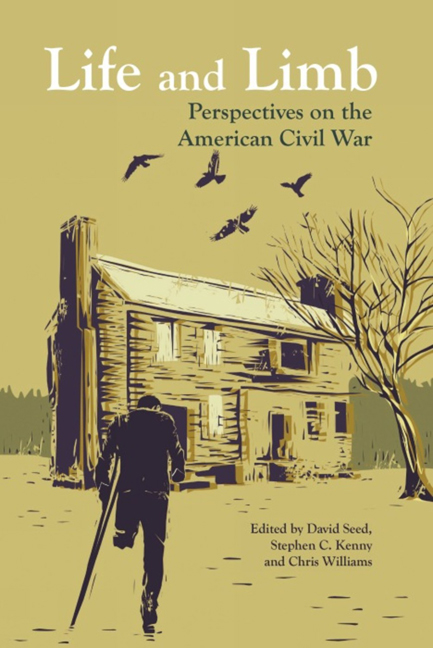Book contents
- Frontmatter
- Contents
- List of Illustrations
- Acknowledgements
- Introduction: Civil War Voices and Views
- MEDICAL AND SURGICAL MEMOIRS
- ACCOUNTS OF NURSING
- With the US Sanitary Commission: On the Hospital Boat Wilson Small: The Other Side of War
- Evacuation from Virginia, 1862: Hospital Transports
- Hospital Routine
- A Death in the Ward: Hospital Sketches
- Nurse and Spy: Nurse and Spy in the Union Army
- Front-line Nursing: Reminiscences of My Life in Camp
- ‘The Mute Look that Rolls and Moves’: Walt Whitman's Civil War
- Specimen Days & Collect
- MEDICAL FACILITIES AND PATHOLOGY
- PHOTOGRAPHY
- AMPUTATIONS AND PROSTHETIC LIMBS
- IN THE FIELD OF BATTLE
- POST-WAR NARRATIVES
- Contributors
- Select Bibliography
- Index
- Plates
‘The Mute Look that Rolls and Moves’: Walt Whitman's Civil War
from ACCOUNTS OF NURSING
- Frontmatter
- Contents
- List of Illustrations
- Acknowledgements
- Introduction: Civil War Voices and Views
- MEDICAL AND SURGICAL MEMOIRS
- ACCOUNTS OF NURSING
- With the US Sanitary Commission: On the Hospital Boat Wilson Small: The Other Side of War
- Evacuation from Virginia, 1862: Hospital Transports
- Hospital Routine
- A Death in the Ward: Hospital Sketches
- Nurse and Spy: Nurse and Spy in the Union Army
- Front-line Nursing: Reminiscences of My Life in Camp
- ‘The Mute Look that Rolls and Moves’: Walt Whitman's Civil War
- Specimen Days & Collect
- MEDICAL FACILITIES AND PATHOLOGY
- PHOTOGRAPHY
- AMPUTATIONS AND PROSTHETIC LIMBS
- IN THE FIELD OF BATTLE
- POST-WAR NARRATIVES
- Contributors
- Select Bibliography
- Index
- Plates
Summary
Attention is the rarest and purest form of generosity.
– Simone WeilWhitman wrote two books about the American Civil War. His major prose work is a war-time autobiography that began as a series of six sketches published in the New York Weekly Graphic as ‘'Tis But Ten Years Since’ (1874). Whitman collected and republished the Weekly Graphic articles as a privately printed book, Memoranda During the War (1875), and later incorporated most of that work into Specimen Days and Collect (1882). Whitman's Civil War poetry was published as Drum-Taps in April 1865, then re-published several months later with Sequel to Drum-Taps (to include his elegies on the death of Lincoln), and eventually incorporated into Leaves of Grass as a cluster of forty-three poems. Whitman's phrase ‘Drum-Taps’ combines two different sets of associations, both important for understanding his response to the war: a call to arms signaled by the percussive intensity of beating drums, and a call to reflection and mourning signaled by the bugle song, ‘Taps’, played at the conclusion of a military funeral. It's a good title. Drum-Taps begins with an unashamed celebration of what the poet calls ‘ruthless force,’ a militaristic drum beat that sweeps aside hesitation and compromise, the political legacy of the 1850s, and lets slip the dogs of war: ‘Through the windows – through doors – burst like a ruthless force,’ Whitman writes in ‘Beat! Beat! Drums!’ – one of his first Civil War poems:
Make no parley – stop for no expostulation,
Mind not the timid – mind not the weeper or prayer,
Mind not the old man beseeching the young man,
Let not the child's voice be heard.
This doesn't sound much like Walt Whitman – at least not the great tender mother-man who shares the misery of mashed firemen and hounded slaves and announces himself as Ralph Waldo Emerson's doctor-poet, raising the despairing with ‘resistless will,’ as he said in ‘Song of Myself,’ dilating them with ‘tremendous breath.’ In the early stage of his career Whitman celebrated the central role of the arts in American public life and argued that the proof of a poet is that his country absorbs him as surely as he absorbs it. It became abundantly clear to everyone, Whitman especially, that America had no interest in absorbing Leaves of Grass. The first three editions languished unsold at his publishers.
- Type
- Chapter
- Information
- Life and LimbPerspectives on the American Civil War, pp. 39 - 46Publisher: Liverpool University PressPrint publication year: 2015



